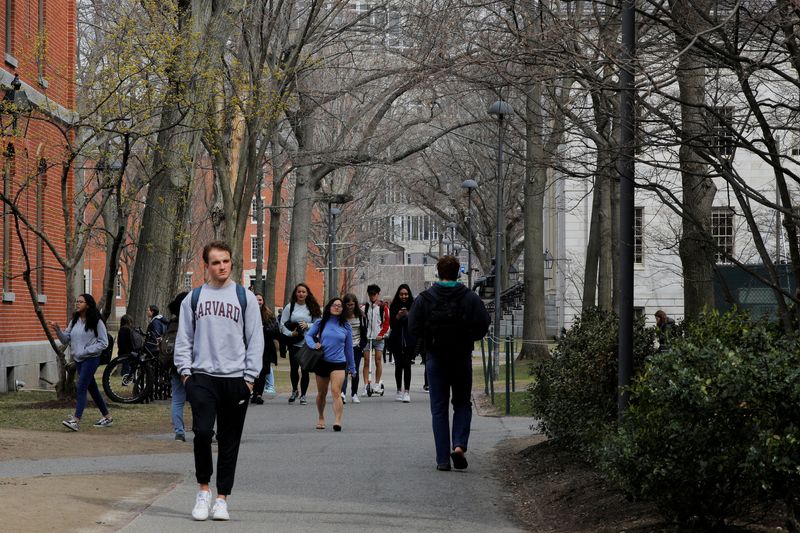By Daniel Wiessner
(Reuters) -Three civil rights groups filed a complaint against Harvard on Monday, claiming its preferential policy for undergraduate applicants with family ties to the elite school overwhelmingly benefits white students, days after the U.S. Supreme Court struck down its race-conscious admissions policies.
The groups filed a complaint with the U.S. Department of Education claiming that Harvard's preferences for "legacy" applicants violates a federal law banning race discrimination for programs that receive federal funds, as virtually all U.S. colleges and universities do.
Last week, the Supreme Court said race-conscious policies adopted by Harvard University and the University of North Carolina to ensure that more non-white students are admitted are unconstitutional. The decision was a major blow to efforts to attract diverse student bodies and is expected to prompt new challenges to admission policies.
Harvard College is the undergraduate school of Harvard University.
The groups in Monday's complaint said the Supreme Court ruling had made it even more imperative to eliminate policies that disadvantage non-white applicants.
Harvard did not immediately respond to a request for comment.
The groups are represented by Lawyers for Civil Rights, a Boston-based nonprofit that describes itself on its website as working with "communities of color and immigrants to fight discrimination."
Ivan Espinoza-Madrigal, the group's executive director, said the Supreme Court last week made clear that any policies that disadvantage racial groups are unlawful by noting that "eliminating racial discrimination means eliminating all of it."
"Your family's last name and the size of your bank account are not a measure of merit, and should have no bearing on the college admissions process,” he said in a statement.
Legacy policies, which are common at U.S. colleges and universities, have become increasingly controversial
President Joe Biden, a Democrat, in remarks following las week's Supreme Court ruling, said schools should consider eliminating legacy policies because they “expand privilege instead of opportunity.”
Several prominent lawmakers from both parties made similar comments. Representative Barbara Lee, a Democrat from California, called legacy policies "affirmative action for white people" in a tweet.
According to Monday's complaint, nearly 70% of Harvard applicants with family ties to donors or alumni are white and are about six times more likely to be admitted than other applicants.
About 28% of Harvard's class of 2019 were legacies, the groups said in the complaint. That means fewer admissions slots were available for non-white applicants who are far less likely to have family ties to the school, they said.
The groups are asking the Department of Education to investigate Harvard's admission practices and order the school to abandon legacy preferences if it wants to continue receiving federal funding. Michael Kippins, one of the lawyers who filed the complaint, said in an email that Lawyers for Civil Rights has not ruled out filing a lawsuit against Harvard in the future.
When the Supreme Court heard the Harvard and UNC cases last October, a lawyer for the group that had sued the schools argued that eliminating legacy preferences "would make Harvard far less white, wealthy, and privileged."

Conservative Justices Neil Gorsuch and Clarence Thomas appeared to agree, pressing Harvard's lawyer on why the school could not get rid of the legacy policy instead of granting separate preferences to non-white students.
The lawyer, Seth Waxman, told the court that there was no evidence that ending legacy preferences would lead to a more diverse student body.